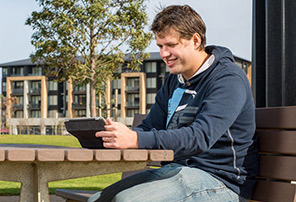You're viewing degree information for International students
You're an International student if you are:
- NOT an Australian or New Zealand citizen
- NOT an Australian Permanent Resident (including Permanent Humanitarian Visa holders)
Please remember your residency (the country you are currently in) has no impact on whether you are an Australian or International student.
UniSA Online degrees normally require international students to study outside of Australia. If you would like to study a UniSA Online degree within Australia, your visa conditions will need to allow online study. For advice on eligibility to study onshore in Australia, please contact us.
Bachelor of Psychology
Degree Level Undergraduate
Year 2025
-
View full entry requirements Hide full entry requirements
Entry requirements
Admission criteria
The admission criteria have been grouped to assist you to easily find the information most relevant to your circumstances. However, you may fit into more than one and the university will consider applicants against each of the relevant criteria.
Certain conditions apply. For more information refer to Appendix 4 of the University's Selection and Entry policy.
N/AApplicants are required to meet one of the following criteria with a competitive result:
Higher education study
- Successfully completed equivalent to a minimum of half a year of full-time study of a higher education program at a recognised higher education provider
OR
Vocational Education and Training (VET)- Complete an award from a registered training organisation at Certificate IV or above
OR
Work and life experience (domestic students only)- Passed a UniSA Online literacy and numeracy test and have relevant work experience, or
- Completed a 12-month UniSA Foundation Studies program or equivalent, or
- Qualify for Special Entry
OR
Recent secondary education- Completed a secondary education qualification equivalent to SACE, such as an interstate year 12 or international Qualification
Essential requirements for admission
N/APrerequisites
Refer to Entry RequirementsAssumed Knowledge
Refer to program schedule and notesEnglish language entry requirements
In addition to meeting academic entry requirements, international students who speak English as a second or additional language must also meet the University's English language entry requirements. The minimum language requirements for this program are:English language testPlease access the following link for a comprehensive list of English language tests accepted by UniSA and other important information in relation to meeting the University’s language requirements: English Language Equivalence Table (PDF)- IELTS total [6]
- IELTS reading [6]
- IELTS writing [6]
- IELTS speaking [6]
- IELTS listening [6]
Admission Requirements by Country
Bangladesh HSC 3.5 Canada High School (OSSD) 60 Eynesbury FSP 310 German Abitur 3.8 Kenya KCSE (average) B Malaysia STPM (best 3) 6 Malaysia UEC 32 Norway GPA 2.8 Pakistan HSSC 75 Sri Lanka A Levels (best 3) 6 Sweden GPA 12.5 UK Board GCE A Levels/HK Board 6 Vietnam 7 Australia 65 IB (best 6) 26 USA SAT (1600) 1050 India (best 4) State Board 70 India (best 4) Central Board 60 HKDSE 15 Nepal NEB 2.41
Degree overview
-
Gain in-demand knowledge across contemporary areas of psychology, including cognitive, developmental, personality, clinical, conservation and biological and learning psychology.
-
Develop an in-depth understanding of human behaviour and motivation complemented by career development skills transferrable to almost any industry.
-
Tailor your degree to your career goals by choosing electives from a range of study areas including ageing and disability, criminal justice, human resource management, health and nutrition, or marketing and communication.
-
Benefit from a qualification informed by well above world-class research in psychology and cognitive sciences1, delivered by a university ranked top 10 in Australia for graduate skills2 and quality education3 in psychology.
-
Study a degree accredited by the Australian Psychology Accreditation Council, mapped as a pathway to specialised postgraduate study to become a professional registered psychologist.
12018 Excellence in Research for Australia (ERA).
2Ranked #7, ComparED (QILT) Student Experience Survey 2021-22, Skills Development Indicator (Undergraduate). Public universities.
3Ranked #9, ComparED (QILT) Student Experience Survey 2021-22, Overall Quality of Educational Experience Indicator (Undergraduate). Public universities.
Snapshot

Join a university ranked top 20 in Australia for psychology4, with a curriculum informed by cutting-edge research, recognised by national teaching and learning bodies, and commended by the Australian Psychology Educators Network for innovative learning.
Skills in psychology are versatile and in-demand, and are transferrable to a diverse range of roles and sectors. Whether you choose to pursue postgraduate study to become a registered psychologist, or apply your knowledge to social work, human services, technology and gaming, entrepreneurship, business, criminal justice, government departments or research, the opportunities to apply the flexible skills you’ll gain are endless.
Designed and delivered by world-class researchers, you’ll discover specialist courses including work and organisational psychology, health psychology and conservation psychology, led by academics who are leaders in these fields and producing contemporary research and practice that applies psychology to global challenges in these important areas.
You’ll graduate with a degree aligned to current industry demand for leaders with an advanced understanding of how people think, behave and respond, informed by world-class research, current trends in the field and the latest innovations.
4Ranked #20, 2025 QS Subject Rankings.
What you'll learn

Designed and delivered by experienced academics who are leading cutting-edge psychology research, you’ll build a comprehensive toolkit encompassing contemporary and specialised areas of psychology.
Gain a comprehensive understanding of the diverse applications and disciplines of psychology across cognitive, biological and learning, developmental, social and community, personality and psychological health and disorders, along with cultural responsiveness to work with Aboriginal and Torres Strait Islander Peoples. You’ll also learn about why our relationships with the natural world are important for mental wellbeing and the health and sustainability of both people and our planet through Connecting and Working with Nature, a course unique to UniSA and informed by future-focused research into contemporary treatments.
Design a degree that fits your career goals by choosing an elective pathway that complements and enhances your foundation psychology skills and knowledge, choosing seven courses from specialist areas such as human services, ageing and disability, criminal justice, health, human resource management, social media, journalism, marketing, and more.
You’ll gain real-world skills through practical learning opportunities, such as designing an evidence-based behavioural intervention, assessing an employee’s abilities and characteristics to determine if they’ll be successful in their role, and developing a behaviour change message related to a conservation issue. Learn about psychological research methods, how to collect and assess data through questionnaires, and how to use statistical software and research tools to conduct data analyses and present your findings.
Graduate with an advanced and sought after qualification that can be applied to a range of industries, along with a personalised development plan to reach your study and career goals, ready to pursue further study or embark on your rewarding career journey.
Why Bachelor of Psychology

From leadership and management roles to forging a career in psychology or even designing tech solutions, an in-depth understanding of what makes people tick is invaluable across almost every industry.
Study a degree purposefully designed by expert academics to equip you with a broad and future-focused skill set, backed by pioneering research and aligned to strong industry demand. You’ll explore modern psychological concepts complemented by career and personal development skills, ensuring you graduate with a comprehensive knowledge base across a range of specialisations.
Regardless of whether you choose to pursue further study to become a registered psychologist or apply your skills immediately in your current workplace, the 100% online Bachelor of Psychology will equip you with a competitive edge and suite of sought after skills across human behaviour, research, critical thinking, communication, data analysis, health and psychological wellbeing.
With a strong understanding of how humans behave and how collaboration and conflict can be managed in both personal and professional settings, you’ll be prepared for advanced roles in a range of industries, including healthcare, social services, business, criminal justice, or marketing, along with the skills to better understand yourself and those around you.
Your career
Professionals with a well-rounded skill set encompassing an understanding of human behaviour, how to manage conflict, and strong research and communication skills are well positioned to succeed in any industry.
A career in psychology is rewarding, challenging and lucrative, with psychology now listed as one of the most in-demand occupations in Australia5. UniSA Online’s accredited Bachelor of Psychology is a strong platform to launch a career from across a diverse range of industries including healthcare, business, criminal justice, education, HR and more, or to build on with specialised postgraduate study.
Careers to consider:
- Registered psychologist (with further study)*: Provide a range of psychological services to people across various stages of life; understand the broad spectrum of mental health issues and how they may occur at any age; design and implement treatment strategies in various settings including primary care, psychiatric and rehabilitation.
- Work and organisational psychologist (with further study)*: Apply psychological principles and research methods to problems in the workplace and to improve quality of life for staff; investigate workplace productivity and management and employee working styles; collaborate with management to develop policies and training initiatives to improve organisational performance and morale.
- Market research analyst: Study consumer behaviour and patterns; monitor and forecast marketing and sales trends; measure the effectiveness of marketing strategies; devise and evaluate methods for collecting data; translate complex data and findings into tables, graphs and written reports; present results to clients and management.
- Psychology research assistant: Conduct and support research activities, including recruiting and liaising with study participants, booking appointments, administering study questionnaires and processing data; record, analyse and present research outcomes to stakeholders; contribute to high-quality publications.
- Case manager: Work across fields such as social and human services and community programs; specialise in aged care, alcohol and other drug rehabilitation, youth and family, or migration services.
- Human resources manager: Lead, assess and develop the staff recruitment, retention and onboarding processes for an organisation; implement training and development opportunities for staff; manage conflict and performance management processes.
*To be a registered psychologist, you must fulfil the requirements of the Australian Psychological Association and Psychology Board of Australia for registration. Students who wish to be an accredited registered psychologist can go on to study UniSA’s Bachelor of Psychology (Honours) degree. Note that on-campus study is required. Students planning to undertake Honours must successfully complete Advanced Research Methods, which is a specialist psychology course in the degree.
5Australian Health Professionals, The In-Demand Need for Psychologists in Australia, 2024.
Thinking of studying soon?
Enquire now to study with UniSA Online
Control how and when you study with our 100% online degrees.
Your study experience and support
Study On Demand
Our online career-focused degrees give you full control and ultimate flexibility over your study. It’s Study On Demand, on your schedule, on your terms.
- Designed specifically for your online learning
Designed by a team of academic and online experts, our course materials are delivered in an interactive way using innovative digital technology and state-of-the-art teaching and learning resources. - Study when it suits you
Our online degrees support students who lead busy lifestyles. With four start dates a year in January, March, July and September there is no need to interrupt your life. - Take control of your study schedule
With all content available from day one of your course, you have the power to plan your study schedule in advance. - Finish each course in 10 weeks
Our courses are delivered within 10-week terms to keep you motivated throughout your degree. Study two courses a term or just one. - 100% online study
You won’t need to come onto campus for coursework, assessments or exams. Complete all study for your degree where it suits you. - Get the help you need
Whether you need help with course content or assessments, we offer the academic support and services you need to be successful in your studies. - Adjust your study to your life
There’s no need to interrupt work and family life or spend money on travel and student accommodation. Organise study around your life. - Learn from world-renowned academics
Get a degree that’s designed and taught by leading academics and industry professionals. - 100% online interactive learning environment
Our interactive online learning environment supports all your study needs. Log in anytime, on any device, wherever it suits you. - Access a library of over 700,000 digital resources
Access a library of more than 700,000 digital resources including e-books, videos and journal articles. Our Ask the Library virtual service can help you locate, access, evaluate, use and reference a range of information resources.
What others are saying
IT Requirements
Generally, any desktop or laptop computer purchased in the past three years should be capable of meeting your online learning needs. While mobile devices such as tablets and smartphones will be able to access most of your online course content, there are likely to be elements of most courses where we recommend you use a desktop or laptop computer. Your computer should be able to:
- run a modern browser (Microsoft Edge, Firefox 24, Safari 5, or Chrome 32 or later versions)
- run Java
- run programs to create documents, spreadsheets and presentations
- use a web camera and headset (or ear pods with microphone)
- Some UniSA Online degrees require an online exam. The online exam software – Remote Proctor Now – has specific capability requirements. Please refer to the system requirements prior to conducting your exam to ensure your computer is compatible.
Access free IT software and resources
As a UniSA Online student, you'll:
- Get free access to the full Office 365 ProPlus suite, which includes full versions of Word, PowerPoint, Excel, Outlook, OneNote, Publisher, Access and Lync software. Install the full suite on up to five different devices (PC and Mac compatible).
- Get 1Tb of personal storage that syncs with your PC or mobile device through OneDrive - it's like an extra hard drive that allows you to open any of your files from any of your devices, whenever you need them.
- Get free access to LinkedIn Learning - Access more than 5000 video courses on a broad range of topics such as: the Microsoft Office suite, time management and study skills, health and wellbeing, communication and presentation skills, photography, film making and designing your own games or mobile apps.
- Be able to connect with others using Microsoft Teams, Yammer and the Outlook Web App.
There are some degrees that have specialised software requirements. We've made this software available to students to access for free - you'll be able to download and install any of the required programs on your own device anywhere and anytime. See if your degree requires specialised software.
Check your device
Our computer system test will determine if your device has the base system resources and software required to study online. It'll also check the speed of your internet connection.
See if your computer, laptop or device is all set up and ready to go – it takes just a few seconds.
The application process is easy – just follow these simple steps:
-
Submit an online enquiry
If you're ready to apply, the first step is to fill out and submit our online enquiry form. Here you'll be asked a series of questions to see if you're eligible. Following your online enquiry, one of our Degree Advisers will contact you at your preferred time to discuss the application process.
Enquire now > -
Speak to a Degree Adviser and start your application
If you're eligible, you'll receive an email outlining the entry requirements and the relevant documentation you need in order to be considered.
In order to verify your academic qualifications, you'll need to upload relevant documents like your official parchment, certificates or transcripts. If you have work experience, you will need to upload your CV as well as any other documents like work references, professional recognition or accreditation or your training certification.
Your email will contain information on the specific documents you need to provide as well as a link to begin your application. You'll be asked to create an account and set your own password.
-
Complete your application and send through your documents
In order to proceed with your conditional offer, you’ll need to complete your application and provide required evidence of your previous study or work experience.
Enquire now >
Alternative Pathways
Australian
There are other pathways you can follow to study this degree, including:
- UniSA College Diploma in Social Sciences (Psychology)
- UniSA College Undergraduate Certificate in University Studies (Social Sciences)
- UniSA Online UniStart
Online Course Facilitator
-
When should I apply?
UniSA Online degrees start four times a year in January, April, June and September. There are key application dates for each term. If you're looking to apply for credit, there are different closing dates you need to be aware of, so it's always best to double check. Key dates can be found at unisaonline.edu.au/key-dates.
-
Do I have to be online at set times?
All of our courses are asynchronous, meaning you choose when to study, whenever it suits you. However, if your degree has online exams, you will need to sit these at a designated date and time. Some courses may also require you to speak to your academics via phone or online communication channels at a mutually agreed time as part of your assessment.
-
What academic support is available?
Our academics are available seven days a week, including weeknights. Throughout your degree, you’ll be supported by our highly experienced academic team of Online Course Facilitators and casual academics. Our teaching team will guide you through your learning and ensure you have an outstanding, high-quality education.
They can help you with your course materials and assessments, provide feedback on your work, assist you with referencing, and can answer any other course-specific queries.
You’ll be able to contact your academics via email, online discussion forums and live messages in the online learning environment. You can also communicate in real-time and chat face-to-face with your academics online.
If you need after-hours learning support, Studiosity is a great resource that can help you with your writing, academic language, grammar and referencing. You’ll also be able to chat online with a Studiosity online adviser.
-
How is my degree structured?
Full-time students study two courses each term. It makes earning a degree completely achievable, especially if you’re working. Your degree is delivered over four terms each year. Each term runs for ten weeks with two-week breaks in between each term.
You’ll also have the option to go part-time, or switch between the two. If you need to take a break in your study, that’s an option too. We recommend speaking to your Student Adviser who can help you update your study plan and check when your courses are offered.
-
What career prospects do I have with my university qualification?
Our degrees are designed in conjunction with industry experts, employers and professional associations, and informed by the latest developments in your field. You will graduate with in demand skills and up-to-date knowledge required by industry.
You will be studying with a university known for its employment outcomes. Your UniSA degree is more than just a piece of paper – it will prepare you to start your career, or take it to the next level. UniSA's online students have graduate employment rates well above the national average.*
UniSA Online qualifications follow the same Government Higher Education Standards Framework as our on-campus degrees. The parchment you receive at the end of your degree will be the same as any other University of South Australia student.
*UniSA External UG full-time employment rate 83% Graduate Outcomes Survey 2018
-
What are the main differences between online, on-campus and distance education?
The knowledge you gain from each mode of study is the same – it's how you get there that's different. When you study online, everything from your course material to weekly activities and assessments are fully online. You'll communicate with academic staff and students via live messages, online discussion forums and email.
Studying on campus requires students to physically come on to campus at specific times to attend lectures, tutorials and practicals. On-campus students have face-to-face contact with academics and fellow students and also communicate via email and online discussion boards.
Distance Education involves physical course material packages being sent to students, usually print based but occasionally audio or video. Communication is usually via telephone, mail and email. In today’s digital era, distance education has been superseded by online education.
More FAQs










